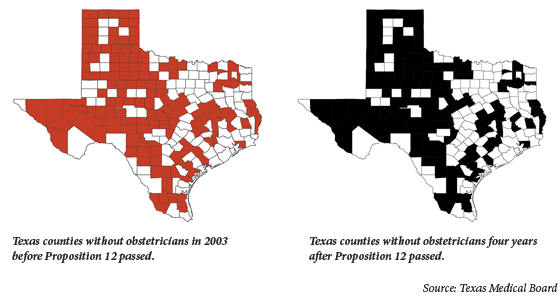In 2003, Texas voters approved a ballot initiative known as Proposition 12 that helped radically restrict state residents’ ability to sue doctors or nursing homes that killed or injured them. Insurance company lobbyists had claimed doctors were fleeing the state because of lawsuits and high malpractice insurance premiums, threatening access to care. Proposition 12 was supposed to fix all that. Not only would doctors rush to Texas for its friendly legal climate, but, supporters claimed, obstetricians would move en masse to the 152 poor, rural Texas counties that had no ob/gyn to deliver local babies.
The New York Times recently declared Prop 12 a huge success because doctors (ob/gyns in particular) are supposedly flocking to Texas now that they don’t have to worry about getting sued. One thing the Times didn’t point out, though, was that the number of those new ob/gyns who’ve moved to rural, underserved Texas is exactly zero. 
The Texas Observer this month crunched the numbers, and came to the not-so-startling conclusion that while there may be more doctors in Texas thanks to tort reform, virtually all of them moved into the state’s richest suburbs, which were already well-stocked with highly paid specialists. As it turns out, doctors don’t shun the Texas sticks because of lawsuits but because they’d just rather live closer to Starbucks and their golfing buddies.
















